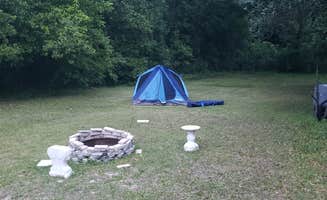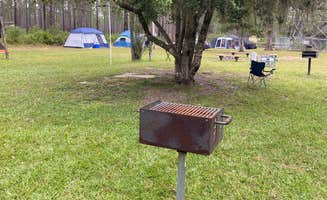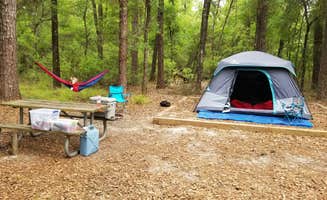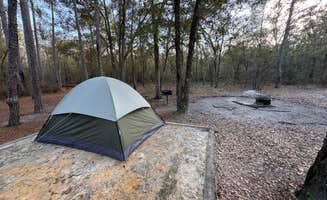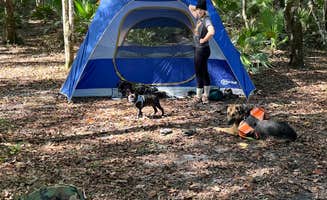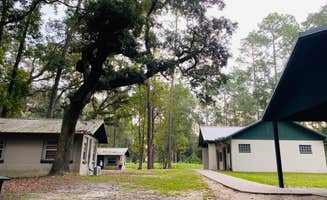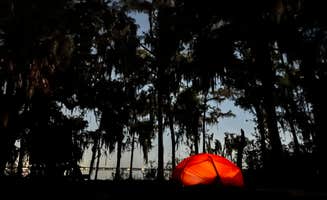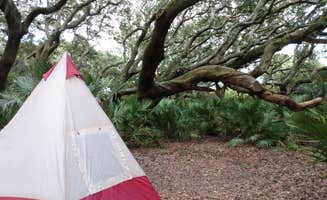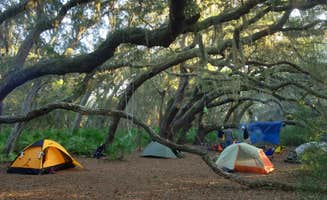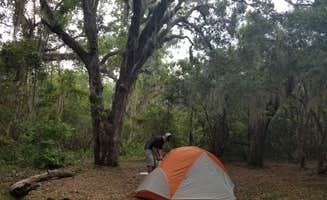Tent camping around Jacksonville, Florida offers diverse primitive experiences in subtropical conditions. The region's elevation rarely exceeds 40 feet above sea level, creating a landscape dominated by river systems, coastal marshes, and pine forests. Summer temperatures regularly exceed 90°F with high humidity, while winter nights can drop below 45°F between December and February, making seasonal planning crucial for tent campers.
What to do
Water activities on Black Creek: Paddle directly from the Black Creek Ravine campsite where the river provides an excellent natural amenity. "My family hiked about 2.4 mi in to this campsite and stayed one night. We liked that you have to hike in, there is no car access. It is about 30 feet through some trees to the river," reports camper Nate D. at Black Creek Ravine.
Wildlife observation: Bayard Conservation Area offers excellent wildlife viewing opportunities during hikes to riverside campsites. "On our way to our campsite we were able to spot many animals including: deer, otter, turkey, and wild pigs," writes Jenn B. at Bayard Conservation Area.
Island exploration: Cumberland Island National Seashore features unique ecosystems accessible only by ferry. "Palm trees filling in the canopy of the largest stand of live oaks left in U.S. that all have spanish moss hanging in them like no movie production set designer could ever replicate make you feel like you time jumped to a jurassic age," describes Charles D. about hiking through the island's interior forests.
What campers like
Riverside solitude: The secluded tent sites along Black Creek provide rare private camping experiences. "For us there was zero competition for the single campsite. The downside of that is the occasional boats or jet ski that come flying past, but for us that only happened a small handful of times," notes Nate D. about camping at Black Creek Ravine.
Accessible primitive experience: Jennings State Forest offers hike-in camping that balances wilderness feel with reasonable access. "We hiked the beach pioneer trail and really enjoyed ourselves. The campsite is about a mile in and has a picnic table and fire ring. There is a stream nearby for water," shares Sean B. about the Jennings State Forest trail system.
Treehouses as alternatives: For tent campers seeking more structure, Camp Chowenwaw offers unique elevated camping options. "The tree houses were so fun to stay in and being higher up gave us chances of a breeze– many in our group brought battery operated fans," explains Jeanene A. at Camp Chowenwaw Park.
What you should know
Water management crucial: Non-potable water sources require treatment at most Jacksonville tent sites. "There's a stop on the way near the other campsite that includes some picnic benches, a (non-potable) water pump, and a bathroom with a roof and toilet paper," mentions Nate D. about facilities at Bayard Conservation Area.
Access logistics: Many tent sites require planning for ferry access or hiking. "You can only get here by boat and backpack to your site. No electricity, cell service is spotty, and when we went in the summertime I was attacked by mosquitos!" warns Elizabeth G. about Hickory Hill on Cumberland Island.
Weather preparedness: Florida's unpredictable conditions demand proper gear. "It was a hot time of year but under the canopy of the live oak trees where the tent sites are located was easily 10+ degrees cooler than elsewhere. However, be warned, it was extremely humid. You might consider taking a small battery-operated fan," suggests David S. about summer camping at Cumberland Island.
Tips for camping with families
Kid-friendly destinations: Dutton Island Preserve offers water access with minimal hiking requirements. "Dutton Island Preserve is gorgeous and it's own little island in Atlantic Beach FL. You can hike around the trails all day, but the best way to experience the island is to camp over night," recommends April L. at Dutton Island Preserve.
Wildlife education opportunities: Cumberland Island provides unique animal encounters for children. "Wild horses running on the beach (and all over the island). Be sure to bring/rent a bike so you can explore all the interesting sites along the islands trails," suggests Kelly M., highlighting activities that engage children.
Swimming options: Several campgrounds feature swimming access for cooling off. "There were short trails, a kayak/canoe launch, a pool, dock, fishing, and clean amenities. There are lots of mosquitoes, so beware of that and bring bug spray," notes Jenn B. about Camp Chowenwaw Park's family-friendly facilities.
Tips from RVers
Limited RV accessibility: Most primitive tent sites near Jacksonville don't accommodate larger vehicles. "The campground were primitive otherwise. The sites are all on one loop, but there are trees and bushes separating each one for some privacy," explains Lizzy about Jennings State Forest Hammock Campground, one of the few areas allowing both tents and small RVs.
Preparation requirements: RVers should plan ahead for limited services. "We went in March and it got pretty chilly at night, but the fire pit helped us stay warm. The portapotty was one of the nicer composting variety, but the campground were primitive otherwise," notes Lizzy about amenities at Jennings State Forest.
Seasonal considerations: Weather significantly impacts Jacksonville area camping. "I only spend 1 night and it poured all night, I would do it again," comments Gregory T., highlighting the region's unpredictable rainfall patterns that RVers should consider when planning visits.


